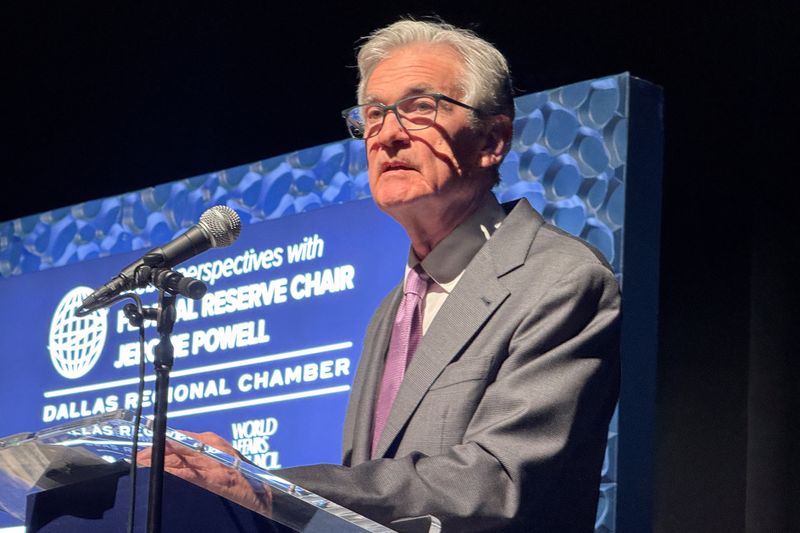By Ann Saphir and Howard Schneider
DALLAS (Reuters) -Ongoing economic growth, a solid job market, and inflation that remains above the 2% target mean the U.S. central bank does not need to rush to lower interest rates and can deliberate carefully, Federal Reserve Chair Jerome Powell said on Thursday.
In remarks that align with a developing expectation in financial markets for fewer rate cuts next year than previously forecast by Fed officials, Powell affirmed that he and his fellow policymakers still consider inflation to be “on a sustainable path to 2%” that will allow the U.S. central bank to move monetary policy “over time to a more neutral setting.”
But the pace of rate cuts “is not preset,” Powell said at a Dallas Fed event, adding that “the economy is not sending any signals that we need to be in a hurry to lower rates. The strength we are currently seeing in the economy gives us the ability to approach our decisions carefully.”
Fed officials and investors are taking stock of how continued U.S. economic strength and the uncertainty around the economic agenda of President-elect Donald Trump’s administration, particularly regarding tax cuts, tariffs and an immigration crackdown, may affect economic growth and inflation.
After Powell’s prepared remarks yields on shorter-term Treasury bonds rose, and traders pared bets that the Fed would follow through as initially expected with a further quarter-point rate cut at its December meeting.
During a question-and-answer session, Powell said that while Fed staff may begin puzzling through the possible impact of tariffs and other campaign proposals from Trump, it will take time to understand, and won’t become clear until new laws or administrative edicts are put in place.
“The answer is not obvious until we see the actual policies,” Powell said. “I don’t want to speculate…We are still months away from a new administration.”
Still, he noted that economic conditions are different now than when Trump began his first term eight years ago, when there was lower inflation, lower growth and lower productivity.
A recent surge in immigration, for example, “made for a bigger economy” at a time of post-pandemic labor shortage, Powell said. While he would not comment on Trump’s intention to deport unauthorized immigrants, he added that “if there are fewer workers there will be less work done.”
More broadly, following an election last week that may have turned on voter perceptions of the nation’s economic ills, Powell said the current situation was actually “remarkably good.”
Read the full article here
